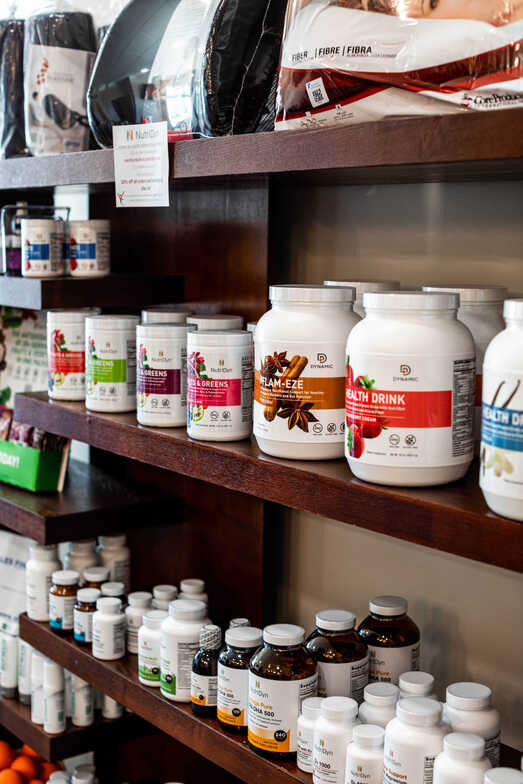
Supplementation is common, but are they needed or helpful for you? This is an ongoing debate, and it is difficult to navigate the endless choices of supplements. It is important to know some do’s and don’ts of proper dietary supplementation. Supplements are supposed to fill the gaps missing in the American diet and are never meant to replace good quality food.
A dietary supplement is used to enhance the diet by increasing both the quality and quantity of total dietary intake. We recommend taking supplements if you do not eat a variety of food, or you have a health concern that requires additional nutritional support. It isn’t realistic that we are able to get everything we need from food. With deteriorating soil quality, hectic lifestyles, and increasing environmental toxins, we need support to help fill those gaps. Some examples that can help are vitamins, minerals, herbs, and amino acids.
Some things to consider before taking a dietary supplement:
- How do you know if your product is good quality?
- How much of a particular nutrient do I need?
- At what time of day should I take it?
- Is it best to take with or without food?
- How long is it recommended to consume?
- Are there safety risks?
- Does it interfere with any prescription medications?
- Is this a reputable company with good quality and manufacturing practices?
Does Quality Matter?
The quality of nutritional supplements varies widely, and it is important to purchase products from companies that can provide certifications assuring high quality ingredients, good manufacturing practices, and guarantee what is listed on the label is what is in the product. It is the wild west when navigating the supplement shelves and not all companies follow quality standards. The product may cost less, but it may not be effective, may contain toxins, and may not meet label claim for dosing. With food allergies on the rise, it is imperative to pay careful attention to labels. A quality certification will verify the product does not contain harmful ingredients, heavy metals, toxins, gluten, soy, dairy, or other allergens.
Some supplements are packed with fillers and inactive ingredients that are not beneficial and can also be dangerous. Negative health outcomes have been associated with unnecessary fillers such as artificial colors, titanium dioxide, hydrogenated oils, and heavy metals. Fish oils or omega-3 s may contain lead, mercury, and other contaminants. Without quality control it is possible mold and fungus may even be present. YUCK! In the case of supplements, you get what you pay for. It is not wise to bargain shop. Professional brands found in healthcare offices and sold directly to providers typically have tighter quality control than over-the-counter supplements.
What to Look For?
It is important to look for these markers of quality control to ensure public safety while verifying that products contain the identity, purity, strength, and composition claimed on the labels. GMP (Good Manufacturing Practices) is industry terminology indicating that a manufacturing plant has been inspected and certified by USP (US Pharmacopeia Convention) or NSF (National Sanitation Foundation) and Consumer Lab.com. GMPs are designed to minimize risk in dietary supplements. The reason for the higher cost of the product is because this certification is not free. This is why many nutritional supplement manufacturers are not officially GMP-certified. However, without the actual GMP certification, you can’t be sure if a company is adhering to the strict requirements. Some other organizations committed to supplement quality include EQP (Emerson Quality Program) and the FDA (Food and Drug Administration). Ensuring the facility manufacturing your supplements has been fully inspected by the FDA is also important. In many cases you get what you pay for, and low-cost products are likely made with low-cost ingredients, which could also mean an ineffective product or one that could be harmful. To ensure the raw materials are of a high quality, confirm that the manufacturer has a Certificate of Analysis (COA) for each ingredient.
It is important to consult with your healthcare professional before taking any supplements. A knowledgeable professional can help you determine what is needed, what dose is beneficial, and if it is safe to take. Just because a supplement worked for one person does not mean it could be safe and beneficial for you.
At Venture we can help determine if there are nutritional deficiencies, areas of health concern, and if additional lifestyle or supplement help may be necessary. Whether you are 2 or 102, experiencing life is best when you are healthy. Do you feel healthy enough to experience and enjoy everything life has to offer? We can offer a comprehensive blood test and an analysis of the results so proactive measures may be taken to attain and keep optimal health.
“An ounce of prevention is worth a pound of cure,” quoted Benjamin Franklin.
Reach out with questions you may have or check out our YouTube channel for many more videos and more information.




